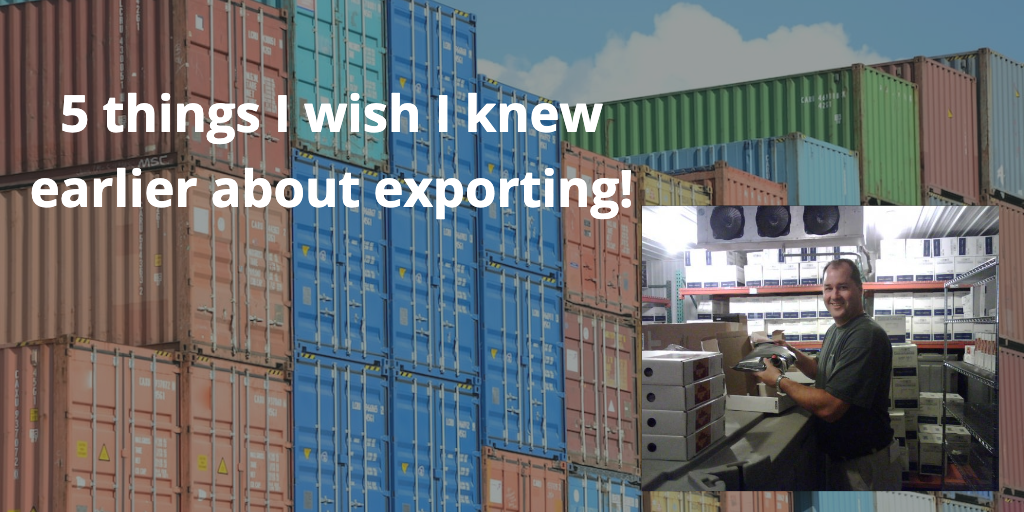I had a great conversation with a colleague the other day about how I knew I was exporting. I thought the question was a bit funny given my background but, to his perspective, my friend only ships domestically. His customers collect the product from his dock. He’s never actively gone out to look for export sales, has never filled out a commercial document that he is aware of and swears that exporting is just too time-consuming and difficult to learn.
All of this made me think, how do you recognize that you are an exporter?
1. Exporting is a frame of mind
If you’ve made just one international sale, even to Canada, you’re an exporter. Yes, that includes the drop-shipment to Canada you made last week. Really, even if you haven’t started selling outside the U.S. yet, start thinking today about your business as an international company. Get comfortable with the idea of exporting by learning more about it and think about how your service or product could help people in other countries. I bet your competitors have, and if you are drop-shipping for your customer, then certainly your customers have as well.
2. Companies that export seriously outperform those that don’t
Research shows that if you export, you significantly increase your company’s chances for success, including being more productive, innovative, resilient, faster growing and enjoying greater revenue. I love using the story of an outboard engine manufacturer here in Wisconsin. They had an awesome domestic business but then suddenly fall and winter came and with that, sales dropped. I suspect it didn’t take that manufacturer too long to figure out that when it is winter here in Wisconsin it is the middle of the summer south of the equator. Recognizing that your products ‘use’ is tied to a season is important! Taking advantage of that knowledge is paramount to a healthy bottom line!
3. Size of your company doesn’t matter nor does your activity
Even if you’re a small business or a one-person shop, if you sell your product outside of the U.S., you’re an exporter. Exporting isn’t reserved for manufacturers; it also includes service providers like writers, graphic designers and translators. I get a feeling of contentment when it dawns on folks that they own international companies.
4. International trade agreements can add to your bottom line
Not knowing where to find favorable new markets is one of the most common barriers exporters face. FTAs are not just for goods, for example, the USMCA (U.S., Mexico, Canada agreement) gives U.S. suppliers preferential market access to Mexico and Canada over countries who would have to pay additional duties and taxes for products and services imported into those countries. Knowing that the U.S. is party to such an agreement signal to exporters that conditions may be favorable. Think of it as giving your customers a discounted price that doesn’t affect your margins.
5. Tap into the wealth of resources here to help you
One of the reasons companies don’t consider exporting sooner is that they didn’t know how, or they were not aware that there are organizations that help Wisconsin companies grow their businesses and/or sell internationally.
Five of the major ones include:
Wisconsin Small Business Development Center Network – The Wisconsin Small Business Development Center (SBDC) is a statewide network supporting entrepreneurs and business owners through no-cost, confidential consulting, and business education. Our regional expertise is accessible to anyone anywhere across Wisconsin.
The Wisconsin SBDC is one of five programs at the Institute for Business & Entrepreneurship, which provides specialized resources and helps clients craft personalized plans to grow their businesses. The Institute is part of the world-class University of Wisconsin System.
We are a nationally accredited member of America’s SBDC, the most comprehensive small business assistance network in the United States.
Wisconsin Economic Development Corporation – The Wisconsin Economic Development Corporation (WEDC) provides export assistance and trade promotion services to companies all along the export continuum.
WEDC’s services include:
- Export development and consulting services provided by Wisconsin-based staff specializing in different parts of the world
- ExporTech™, delivered in partnership by the Wisconsin Manufacturing Extension Partnership and the Northwest Wisconsin Manufacturing Outreach Center
- A network of authorized trade representatives that can conduct market assessments, partner searches, and business meeting facilitation activities in nearly 100 countries around the world
- Global Trade Ventures that make it easier to travel to key markets and meet with potential partners and customers
- International Market Access Grant (IMAG) Program that provides funding to support a company’s specific export development and deployment strategy
U.S. Commercial Service – The USCS is part of the International Trade Administration, U. S. Department of Commerce. USCS has offices throughout the country and in over 120 foreign consulates and embassies. They can help you develop an effective export strategy, operationalize your organization for exporting and identify and qualify leads for potential overseas buyers, distributors, joint venture partners and licensees from both private and public sources.
Wisconsin District Export Council – The DEC is a non-profit organization composed of experienced exporters and business professionals who provide support services to Wisconsin exporters. Each DEC member has been appointed by the U.S. Secretary of Commerce because of his or her real-world expertise in international trade matters and commitment to volunteerism. DEC members share their time and specialized expertise with small- and medium-sized businesses that are interested in starting to export or expand into new markets.
Wisconsin Department of Agriculture, Trade and Consumer Protection (DATCP) – The International Agribusiness Center identifies export opportunities around the world for Wisconsin’s agricultural companies and producers. The Center’s economic development consultants provide technical expertise and market development initiatives to aid the growth of Wisconsin agriculture through increased exports and the development of trade enhancing partnerships. The Center uses client feedback, global trends, market and export data to establish criteria for identifying target markets and activities.
Services include:
- Beginner Exporter: One-on-one consultations, educational seminars
- Intermediate Exporter: Export documentation, market research and financing
- Advanced Exporter: Promotions and market development programs
Developing an export marketing plan is essential to the growth and sustainability of your business. Exporting diminishes the effects of an economic downturn and reduces the effect that any particular season may have on your product. Exporting boosts your bottom line, increases your position amongst your competitors and provides your local economy with long-reaching benefits.
The SBDC is here to help you get underway. We provide the technical support your company needs to be prepared to do business in a foreign market. For more information, see us at https://wwwtest.wisconsinsbdc.org/services/consulting/goglobal/

